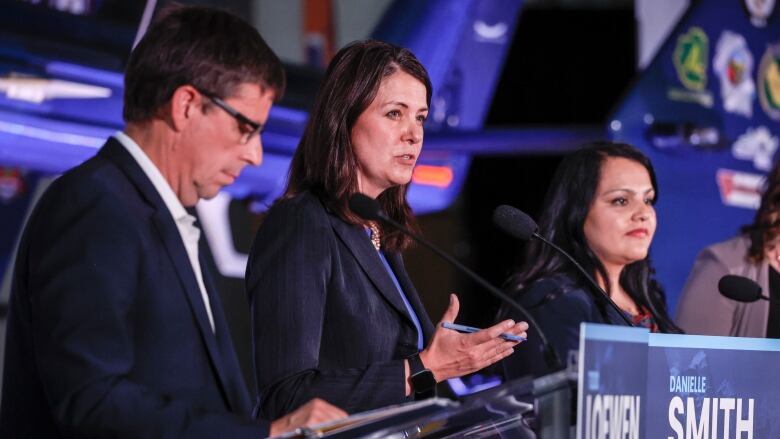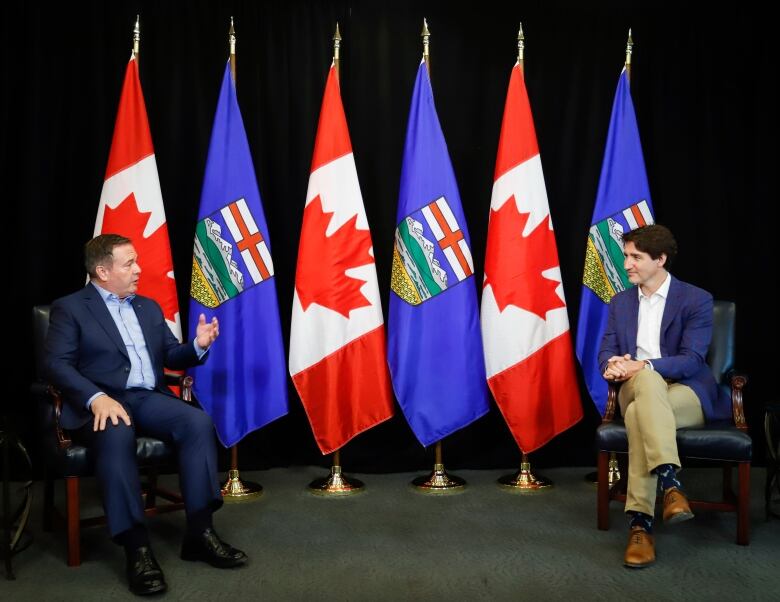All about that base: Why UCP leadership contenders probably aren't speaking to you
A narrow subset of Alberta will choose the next premier. Their priorities don't align with everyone's

Most Albertans can be forgiven if they don't feel spoken to in a United Conservative leadership race that's centred largely around bitter memories of COVID restrictions, Alberta sovereignty and other Ottawa-centric provocations.
That's because campaigns aren't speaking to most Albertans. And that's by design.
Party sources tell CBC there are around 123,000 UCP members who enlisted before the recent cutoff date to get a leadership ballot. That's roughly double the number who held UCP memberships for May's review vote on Jason Kenney's leadership.
While party organizers are encouraged by the number, it still means that a mere 3.5 per cent of eligible Albertans (everyone aged 14 and up can join UCP), will effectively determine who becomes premier until next May's general election.
This isn't to allege anything nefarious or anti-democratic this is the Canadian political and parliamentary system, in which the duly-chosen governing party gets to replace its leader in a manner of its choosing, either by caucus or by membership.
It's happened before provincially, when successors were chosen for premiers Alison Redford and Ralph Klein, and federally, after Jean Chretien and Brian Mulroney stepped aside before an election. It's going on right now next door in British Columbia, where New Democrats will choose who's in charge next when Premier John Horgan departs in December.
The battle for the 3.5%
But it's worth underlining that Danielle Smith, Travis Toews, Brian Jean and the other candidates aren't campaigning for the attention and votes of Albertans. They're trying to persuade a subset of a subset the United Conservative supporters (UCP netted one million votes in 2019's election) who are keen enough to pay $10 for party memberships.
It's especially relevant when this conversation seems so detached from the broader conversation that Albertans are having.
The UCP leadership race's most hot-button issues, judging by both the social-media output of the campaigns and the sort of debate questions they've fielded, are overwhelmingly tied to provincial anger towards Ottawa. Next on the list seems to be resentment of past COVID measures, and pledges to never go into "lockdown" again.
But when pollster Janet Brown surveyed Albertans in June, their top-of-mind issues were affordability and inflation, economy, and health care. Down in the margins of public priorities were federal relations, equalization, the pandemic.
Dive deeper into the poll data, and it's only likely UCP voters along with supporters of the farther-right Wildrose Independence Party who prioritize these issues.

Some UCP leadership contenders, like Jean, Toews and Rebecca Schulz, led off their campaigns focusing on some of the more broadly-relevant issues. But as Danielle Smith captured fire with her constitutionally dubious Alberta Sovereignty Act and no-matter-what pledges about future COVID restrictions, others chased her down those same avenues.
Consider Rajan Sawhney, campaigning as a "moderate" conservative. She's not made federal issues a priority, and has lambasted Smith's sovereignist bill, but this week she came out with a policy release with the old hard-right battle cry "More Alberta, Less Ottawa," and her own pledge to "fight for Alberta's autonomy."
This is also why most leadership hopefuls, even the more federalist among them, initially committed to joining next week's forum co-hosted by Alberta Prosperity Project, a group barnstorming the province to promote outright independence from Canada. (Toews and Schulz pulled out after CBC inquired about their attendance.)
Campaigns may find the Alberta separatist message and some of the group's other conspiracy-mongering unseemly, but they know this is a surefire way to communicate with a sizeable chunk of the UCP membership.
Why does the Kenney government and the cast of leadership contenders push for an Alberta provincial police force when rural councils and the general public don't want it? Because much of the UCP base wants it.
Why did Kenney contest the 2019 general election on the slogan "Jobs, economy, pipelines" but gin up supporters at party rallies with pledges for a referendum against federal equalization? He needed the hardcore UCPers to volunteer and donate.
The candidates' teams recognize those who hold UCP membership are a distinct group from those who have voted or intend to vote for the party a more activist core. And that's why there's little merit in polling the general public, or even Conservative voters, to see who's up and down in this contest; organizers will wait until the party submits the member list to them, and they'll survey those self-selected folks.
From a slice to the whole dang pie
Kenney had the luxury of two years between winning his 2017 leadership race and being able to switch message tracks to woo the broader Alberta electorate. Federally, Conservative leadership frontrunner Pierre Poilievre may have three years after winning over his party base before he campaigns on a message for all Canadian voters' ears.
The winner in October's vote-by-mail UCP contest goes almost immediately from talking to 3.5 per cent of Albertans to making decisions on behalf of all of them. That means they're about to come face to face with a public that will look quizzically at this preoccupation with how to most effectively put the Trudeau Liberals on the defensive, when they're more anxious about the cost of living and emergency-room shortages.
If Smith indeed wins, Albertans will have to wait until whatever comes after her "Day One" and Bill 1 priority, that sovereignty jab. And she'll face her own challenges figuring out her new, much larger audience.
All her rivals are MLAs, or recent cabinet ministers, so they're familiar with the challenges of representing or governing on behalf of a broader public. Smith has been in media and advocacy and has said she exited her Global radio show gig because she wanted more freedom to evade the mainstream narratives on COVID, and find her own niche.
She has done so, and it turns out there's apparently significant overlap between the crowd she's cultivated and the 123,000 Albertans who belong to the UCP. Should she win, it will matter to Albertans how she perceives the world outside this partisan echo chamber she's been immersed in.












_(720p).jpg)


 OFFICIAL HD MUSIC VIDEO.jpg)
.jpg)



























































































